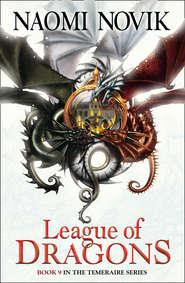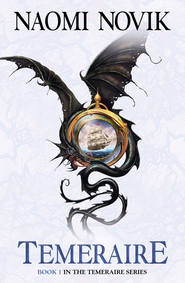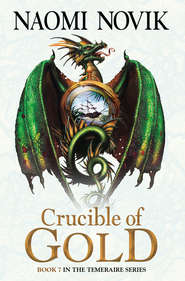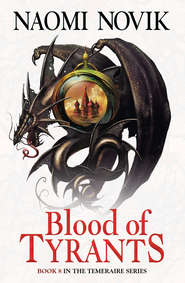По всем вопросам обращайтесь на: info@litportal.ru
(©) 2003-2024.
✖
Tongues of Serpents
Автор
Год написания книги
2019
Настройки чтения
Размер шрифта
Высота строк
Поля
‘You needn’t, at all,’ Temeraire put in, ignoring the looks of disapprobation which the aviators flung at him. ‘You can take yourself a perfectly tasty kangaroo, anytime you like.’
‘Well, I don’t like; what I like is the smell of that meat over there,’ the hatchling said, and put its head over on its side considering. ‘As for you: you are an earl’s son, is it?’ it inquired of Rankin intently. ‘An especially good earl?’
Rankin looked a little taken aback, and said after a pause, ‘My father’s creation dates from the twelfth century.’
‘Yes, but, is he rich?’ the hatchling said.
‘I hope,’ Rankin said, ‘that I may not be so impolite as to speak crassly of my family’s circumstances.’
‘Well, that may be pretty-spoken, but it don’t tell me anything useful,’ the hatchling said. ‘Does he have any cows?’
Rankin hesitated, visibly torn, and then said, ‘I believe there are some dairy farms on his estates — several hundred head among them, I imagine.’
‘Good, good,’ the dragonet said, approvingly. ‘Well, let us have a look at this harness, and as long as you are busy being polite, you might give me a taste while I am thinking it over; I do like your hair,’ it added; Temeraire did have to admit Rankin’s was of a particularly appealing shade of yellow which looked a little like gold in the sunlight, ‘and your coat, although that fellow has nicer buttons,’ meaning Granby, ‘but I suppose you can have some like that put on?’
‘But you do not want him, at all!’ Temeraire said. ‘He is an extremely unpleasant person, and neglected Levitas dreadfully, although Levitas was forever trying to please him, and then Levitas died, and it was all his doing.’
‘Yes, so you have said, over and over, while I was getting ready to come out; and all I have to say is, this Levitas fellow sounds a right bore,’ the dragonet said, ‘and I shall like to have a captain who is the son of an earl, and rich, too; I don’t aim to be eating kangaroo day-in and day-out, thank you; or hurrying about catching prizes for myself, either. But that,’ he added, looking at the harness which Rankin was with a slightly uncertain air proffering, ‘is not nice enough by half: those buckles are dirty, it looks to me.’
‘They are certainly dirty,’ Temeraire put in urgently, ‘and so was Levitas’s harness, all the while: quite covered with dirt, and Rankin would not even let him bathe.’
‘This is only a temporary harness,’ Rankin said, adding tentatively, ‘and I shall have a nicer made for you, chased with gold,’ in what Temeraire felt was a quite shameful bargaining sort of manner.
‘Ah, now that sounds more like,’ the dragonet said.
‘And I shall give you a name, straightaway,’ Rankin added, with more firmness. ‘We shall call you Serenitus—‘
‘I have been thinking Conquistador, myself,’ the dragonet interrupted him, ‘or perhaps Caesar; only as I understand it, the conquistadors came out of it with a good deal more gold.’
‘No one is going to call you Caesar,’ Temeraire said, revolted. ‘You are only going to be a middleweight, anyway, if you are that big: Wringe is not even as big as a Reaper.’
‘You never know,’ the dragonet said unfazed. ‘It is better to be prepared. I think Caesar will suit me very well, now I think about it a little more.’
‘Well, I wash my hands of it all,’ Temeraire said to Laurence, afterwards, more than a little aggravated watching Caesar, ‘Oh! How ridiculous — eating a second sheep!’ Rankin had sent out for it, after Caesar had eaten all the first one, down to the scraps, and suggested with a very transparent air that perhaps eating quite a lot while he was fresh-hatched would help him to grow bigger. ‘And I do not believe that at all,’ he added.
‘Well, my dear, they seem to me admirably suited,’ Laurence said dryly. ‘Only I am damned if I know what we are to do now.’
Chapter Four (#ulink_bd1c495b-0554-5790-920d-ec15f0088e51)
‘Laurence, I hope you will forgive me,’ Granby said, low, while across the way Caesar continued his depredations upon the livestock which Rankin had evidently intended for his first week of feedings. ‘I didn’t mean to say a word, unless he should manage to harness the beast; but he has, and there is no way around it — you must let me go-between, and make up the quarrel.’
‘I beg your pardon?’ Laurence said, doubtfully, certain he had misunderstood; but Granby shook his head and said, ‘I know it’s not what you are used to; but pray don’t be stiff-necked about it: there can’t be two captains in a covert at dagger-ends forever and anon, and you can’t fight him; so it must be made up, whatever you think of the blighted wretch,’ he added, rather failing at conciliation.
It was by no means what Laurence was used to; the thought of offering Rankin anything so like apology, for an act which had been richly merited by his behaviour, and which Laurence would gladly have drawn swords to justify, appalled more than he could easily bear.
‘You needn’t think of it that way,’ Granby said, ‘for it’s only that you have the heavier beast, you know: that is the rule. It’s for you to make the first gesture; he can’t, without looking shy.’
Laurence could not be so easily reconciled, despite all the obvious sense in this policy, to a gesture which to him partook of the worst part of both withdrawal and deceit. ‘For I do not withdraw, John; I cannot withdraw in the least. It would be rankest falsehood for me to pretend in any way to regret my actions, or any offence which was given by them; and under the circumstances, such a withdrawal must bear a character of self-interest which I must despise.’
‘Lord, I am not saying you must truckle to the fellow!’ Granby said, with a look half affection and half exasperation. ‘Nothing of the sort; you only need to let me go forward, and have a word with him, and then you shan’t speak of it again, either of you: that is all. No one will think any less of you: the contrary, for it would be rotten for the dragonet, you know. If you are giving his captain the go-by, it must make a quarrel between him and Temeraire, too, and you can’t say that is fair.’
This argument had too much justice for Laurence to ignore; he managed barely to make himself nod, once, by way of granting permission, and looked the other way when Rankin joined Granby’s table that night, in a small hostelry, for the dinner which should honour his promotion. Granby cast a worried look at him, sidelong, and said to Rankin, in tones of slightly excessive heartiness, ‘I am afraid Caesar means to lead you something of a merry chase, sir; a most determined beast.’
Granby, who had more knowledge of the management of a determined if not obstreperous beast than any ten men, might have been pardoned for some degree of private satisfaction in this remark. ‘If it is any consolation,’ he had said to Laurence, earlier, rather more frankly, ‘the little beast is his just deserts, anyway: how I will laugh to see him dragged hither and yon, protesting all he likes that Caesar must obey. That creature won’t take being shot off in a corner and left to rot.’
Laurence could not wholly take amusement in any part of the circumstances which forced him to endure Rankin’s company; but he did not deny a certain grim satisfaction, which became incredulous when Rankin answered, coolly, ‘You are very mistaken, Captain Granby; I anticipate nothing of the sort.
‘That there has been some mismanagement of the egg, I cannot dispute,’ Rankin added, ‘nor that his hatching did not give cause for concerns such as you have described: but I have been most heartened since those first moments to find Caesar a most complaisant creature by nature. Indeed, it is not too far to say I think him a most remarkable beast, quite out of the common way in intelligence and in tractability.’
Laurence forgot his feelings in bemusement and Granby looked equally at a loss for response, when so far as they had seen, Caesar had spent the afternoon demonstrating only an insistent gluttony. Perhaps Rankin chose to deceive himself, rather than think himself overmatched, Laurence wondered; but Rankin added, with a self-satisfaction that seemed past mere wishful thinking, ‘I have already begun instructing him on better principles, and I have every hope of shaping him into the attentive and obedient beast which must be the ambition of every aviator. Already he begins to partake of my sentiments and understanding as he ought, and to value my opinion over all others.’
‘Well,’ Granby said doubtfully, then, ‘Mr. Forthing, the bottle stands by you,’ and the conversation limped away into a fresh direction; but in the morning Laurence was astonished to find Rankin at the promontory, with a book, to attend Caesar’s breakfast. He seated himself at Caesar’s side and began to read to the dragonet as the beast ate: an aviation manual of some sort, Laurence collected from what he overheard, although the language was very peculiar.
‘Oh, he has never dug up that antique thing,’ Granby said, with disgust, and added, ‘It is from the Tudor age, I think; all about how to manage a dragon. We read it in school, but I cannot think of anyone who gives it a thought anymore.’
Caesar listened very attentively, however, while he gnawed on a bone, and said earnestly, ‘My dear captain, I cannot disagree at all, it seems very sensible indeed; pray do you think I ought to try and manage another sheep? I take it quite to heart, what the book says about the importance of early feeding. If it accords with your judgment, of course: I am wholly willing to be guided by your superior experience; but I must say I find I am so much better able to attend when I am quite full.’
‘This,’ Iskierka said, ‘is what comes of worrying about hatchlings.’
Temeraire did not think that was very just: he had not worried about Caesar for very long, certainly, and at the present moment he would not have given one scrap of liver for all Caesar’s health and happiness; not, of course, that Caesar seemed to be in any short supply of either. In one week he had eaten nine sheep, an entire cow, a tunny, and even three kangaroos, after Rankin had been forced to reconsider the speed at which he was depleting his funds.
That would have been quite enough to make him intolerable, particularly the smacking, gloating way in which he took his gluttonous meals, but apart from these offensive habits, he would strut, and wake one up out of a pleasant drowse in the midday heat by singing out loudly, ‘Oh, my captain is coming to see me,’ and he would with very great satisfaction inform Rankin that he was looking very fine, that day, and make a pointed note of every bit of gold or decoration which he wore.
The one consolation which Temeraire had promised himself, Rankin’s certain neglect, which should also ensure his absence, did not materialize: instead Rankin was forever coming, and so Temeraire did not only have to endure Caesar, but Rankin also, and hear his irritating voice all the day, reading out from this absurd book full of nonsense about how one ought to never ask questions of one’s captain, and spend all one’s time practising formation-manoeuvres.
‘I cannot understand in the least,’ Temeraire complained, ‘why when he had the very nicest of dragons, he was never to be seen; and now one cannot be rid of him. I have even hinted a little that he might take himself off, in the afternoons when it is so very hot and one wishes only to sleep, but he will never go.’
‘I imagine he had a better chance of society more to his liking, in Britain,’ Laurence said. ‘He was a courier-captain on light duty, and might easily visit friends of his social order; he has never been a particular favourite, among other aviators.’
‘No, I am sure he has not,’ Temeraire said, disgustedly.
Meanwhile there was no end of trouble to be seen, because the company Rankin did keep, aside from Caesar, was Governor Bligh, whom Temeraire had now classed a thoroughly unpleasant sort of person: not surprising when one considered he was part of Government. Bligh certainly had some notion that when Caesar was a little more grown, Rankin would help put him back in his post; Temeraire had even overheard Rankin discussing the matter with Caesar.
‘Oh, certainly,’ Caesar said, ‘I will always be happy to oblige you, my dear captain; and Governor Bligh. It is of the first importance that our colony—’ Our colony, Temeraire fumed silently, ‘—should have the finest leadership.
‘I understand,’ he added, ‘that governors have quite a great deal of power; is that not so? They may give grants of land?’
Rankin paused and said, ‘Yes; unclaimed land is in the governor’s gift.’
‘Just so, just so,’ Caesar said. ‘I understand it takes a great deal of land to raise cattle, and sheep; I am sure Governor Bligh must be well aware of it.’
‘A clever beast,’ Laurence said dryly, when Temeraire with indignation had repeated this exchange to him. ‘I am afraid, my dear, we may find ourselves quite at a stand.’
‘Laurence,’ Temeraire said, shocked, ‘Laurence, surely you do not imagine he could beat me. If ever he tried to cause us any difficulty—’
‘If you were ever to come on to blows,’ Laurence said, ‘we should already be well in the soup; such a conflict must at all costs be avoided. Even in defeat, he might easily do you a terrible injury, and to run such a risk, for the reward only of making yourself more an outlaw and terrifying to the local populace, cannot be a rational choice. Consider that every week now brings us closer to word from England, and I trust the establishment of a new order.’
‘Which,’ Temeraire said, ‘is likely to be just as bad as Bligh, I expect.’











